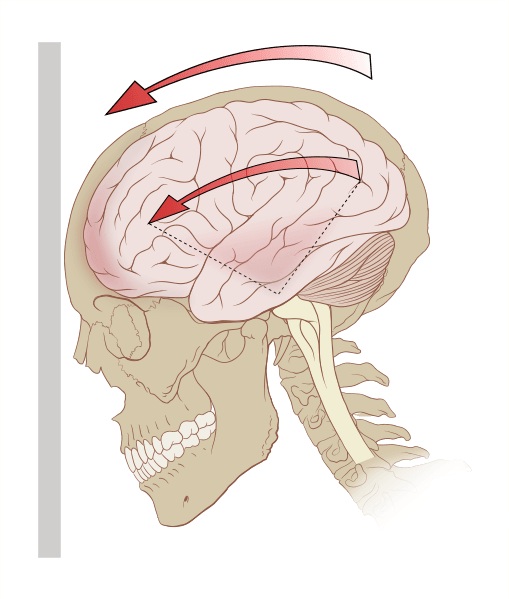A concussion refers to a head injury that could possibly lead to loss of consciousness.
 The symptoms usually associated with concussions can be quite disturbing. Also, it is no less problematic to get effective medical treatment than to deal with post-concussive symptoms. To highlight the danger inherent in concussions, a person suffering from this condition may not even be able to recall passing out, if he or she actually did.
The symptoms usually associated with concussions can be quite disturbing. Also, it is no less problematic to get effective medical treatment than to deal with post-concussive symptoms. To highlight the danger inherent in concussions, a person suffering from this condition may not even be able to recall passing out, if he or she actually did.
Understanding the Symptoms of Concussion
Concussion can prove to be a rather frustrating medical condition. The fact that an external head injury or sore has healed does not mean that all is well inside the head. A patient may continue to experience symptoms, even when diagnostic tests such as a CT scan of the brain fails to reveal any injury. Post-concussive symptoms that a patient may experience could include difficulty in waking every morning, migraine-like headaches, and feeling sleepy during the day. In addition, dizziness, fatigue, blurred vision and possibly depression can be signs of this condition.
Some medical experts specializing in treatment of concussions are often restricted to the prescription of drugs to help deal with pain and headaches that may be associated with the medical condition. They often cannot tell when the symptoms being experienced by a patient will subside. Competent neurologists can help make a proper diagnosis of symptoms and their seriousness. They can also help determine if these symptoms are a result of a work-related injury. It may also be ascertained if there is an existence of a neck injury. A skilled neurologist will also be able to tell you what can be done to prevent permanent injury to your brain.
Rating Post-Concussion Symptoms
Mere complaints about pain will not make post-concussive symptoms ratable, if not proven by required diagnostic tests. Judging by the AMA Guides for Evaluation of Impairment, it not easy to rate these symptoms for permanent injury. An adjuster will usually need medical reports indicating a problematic condition before arranging for an evaluation. Testing by a neuropsychologist may be helpful in revealing a ratable physical brain injury, if tests by a neurologist do not reveal their existence. The doctor that will rate the symptoms will usually look for memory loss impairment and irregularity in the consciousness level of patient in relation to how this could impact their everyday activities.
Getting Legal Help
If you have suffered from a head injury at your workplace, it would be wise to get in touch with an attorney for guidance and assistance. Post-concussive syndrome (PCS) is usually diagnosed after the treatment of any outward injury. As a result of this, PCS is often hard to detect or ascertain.
As lawyers working for your insurer likely want to disprove that your head injury is covered by workers’ compensation, you want a good lawyer to prove them wrong and help get your rightful compensation.
If you experienced a head injury on the job in Missouri, contact the Law Office of James M. Hoffmann to discuss your case for free. Call us today at (314) 361-4300.
Work Related Injuries
Work-Related Injuries
Work Related ACL Injury
Leg Amputation
Finger Amputation
Ankle Injury
Ankle Replacement
Arthroscopic Surgery
Work Related Arthritis
Accidental Asphyxiation
Work Related Asthma
Avulsion Injury
Back Injury at Work
Back Pain from Work
Lower Back Pain at Work
Chronic Back Pain
Head Injury Internal Bleeding
Internal Bleeding after Injury
Blood Related Illness
Broken Bones
Brain Injuries
Traumatic Brain Injury
Bursitis Work Related
Burn Injury at Work
Electric Burn
Chemical Burn
Calcaneus Fracture
Sudden Cardiac Arrest
Cardiovascular Disease
Carpal Tunnel Work Related
Cartilage Injury
Cervical Disc Replacement
Cervical Fusion
Chronic Illness
Work Related Chronic Pain
Work Related Concussion
Contagious Disease
Work Related COPD
Skin Corrosion
CRPS Disease
Crush Injuries
Cubital Tunnel Syndrome
Work Related Death
Degenerative Bone Disease
Degenerative Disc Disease Work Related
Reflex Sympathetic Dystrophy
Work Related Tennis Elbow
Elbow Injury
Epicondylitis at Work
Work Related Eye Injury
Fibromyalgia
Work Related Foot Injuries
Work Related Injuries to the Hand
Hand Arm Vibration Syndrome
Work Related Head Injury
Closed Head Injury
Open Head Injury
Work Related Hearing Loss
Heart Attack Work Related
Stroke at Work
Heat Stroke at Work
Intracerebral Hemorrhage
Hernia Work Related Injury
Work Related Herniated Disc
Hip Fracture
Hip Replacement
Hip Injuries
Intracranial Injury
Broken Jaw
Work Related Knee Injuries
Knee Fracture
Laceration
LCL Injury
Legionnaires Disease
Ligament Tear
Limb Loss
Lumbar Disc Replacement
Lumbar Fusion
Lumbar Spinal Fusion
MCL Tear
MCL Injury
Meniscus Tear
Work Related Mental Illness
Mesothelioma from Work
Work Related Muscle Problems
Work Related Neck Pain
Work Related Neck Injury
Nerve Damage from Work Related Injury
Neurological Disorders
Occupational Disease
Organ Damage
Pain and Suffering from Work Related Injury
Paralysis
Patella Fracture
Pelvic Fracture
Plantar Fascitis
Pre Existing Work Related Injury
Work Related PTSD
Radiation Sickness
Repetitive Stress Injury
Rhabdomyolysis
Rotator Cuff Tear
Rotator Cuff Surgery
Work Related Rotator Cuff Injury
Sciatica Work Related
Shift Work Disorder
Shoulder Fusion
Shoulder Impingement
Shoulder Injury
Work Related Shoulder Pain
Sick Building Syndrome
Skull Fracture
Spinal Cord Injury at Work
Spondylolysis
Sprain at Work
Work Related Repetitive Strain Injury
Work Related Stress
Stress Fracture
Subdural Hematoma
Work Related Tendonitis
Lost Tooth at Work
Trigger Finger Work Related
Vertebroplasty
Vision Impairment
Lost Vision at Work
Work Related Wrist Injuries
photo credit: Patrick J. Lynch, medical illustrator via Wikicommons
